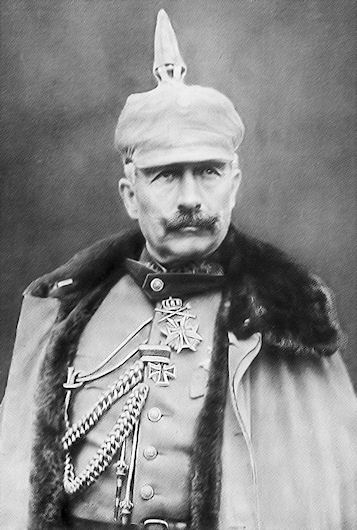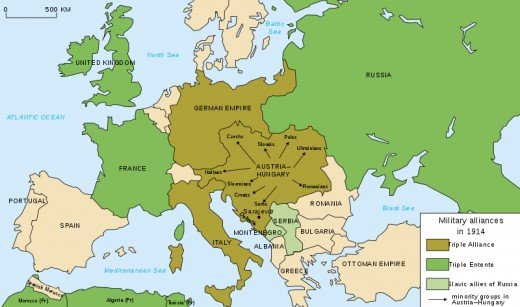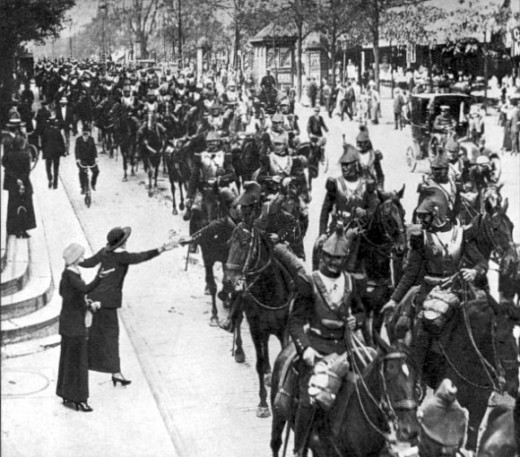World War One (abbreviated as WW1) was the first conflict to drag a large number of countries from all around the globe into a fully industrialised conflict. The war would result in: a huge amount of casualties, major technological changes, the introduction of the concept of 'total war', significant social changes and even the fall of old empires. The course of 20th and 21st-century history can be traced back to the turning point of WW1 (1914-1918).

Build up to war (pre-1914)
Pre-war Europe was made up of multiple different empires that were ruled by interrelated royal houses. The British Empire was the dominant force in the world and spanned over 20% of the global land mass; key outposts included India, Canada, Australia, New Zealand and South Africa. The Empire was primarily a trading empire, and the British army was a very small force but the soldiers were all full-time professionals and well trained. The British navy was the largest and most powerful in the world.
The German Empire was a relative newcomer, only being formed in 1871 after the Franco-Prussian War. Germany had a strong economy and was at the forefront of technological progress. However, the main political power was held by the military and the German Emperor (Kaiser) Wilhelm II. Wilhelm was a young leader and wanted to expand the German Empire; a major cause of tension among the older European powers. The Germans had built up a strong navy to try and compete with the British, but the British were always one step ahead in the naval arms race. Conversely, the German army was the largest and best army in the world.
France also had an empire and significant tensions with neighbouring Germany, particularly due to territory lost in the Franco-Prussian war. The French army was the second largest in Europe and also a formidable force. The Russian Empire had the potential for the largest army but had significant problems with slow mobilisation and its economy lagged behind the other nations. The Austro-Hungarian Empire was a complex entity that was comprised of many different ethnic groups.
Germany signed alliances with Austria-Hungary and Italy in 1879 and 1882 respectively, this is known as the Triple Alliance. British worries over German growth persuaded them to sign alliances with their traditional enemies France and Russia in 1904 and 1907 respectively. This is known as the Triple Entente. The Entente furthered the Germans fears of encirclement and a potentially crippling war on multiple fronts. Parts of the German military, therefore, concluded that war should be risked as they believed they could defeat France before Russia mobilised significant forces.

1914: Ignition
June 28th - Franz Ferdinand, the heir to the Austro-Hungarian Empire, is assassinated by Gavrilo Princip in Sarajevo.
Gavrilo Princip was linked to the Black Hand society in Serbia.
July
6th - Germany assured Austria-Hungary full support for an upcoming war with Serbia.
23rd - Austria-Hungary sends Serbia a ten-point ultimatum, with 48 hours to respond. The Serbians would accept all proposals bar one, but this was deemed insufficient by Austria-Hungary.
26th - Serbia begins mobilisation.
28th - Austria-Hungary declares war on Serbia.
30th - Warships bombard Belgrade, the capital of Serbia.
Russia begins mobilisation against Germany and Austria-Hungary, to support Serbia.
August
1st - Germany declares war on Russia. France mobilises its forces in support of Russia.
The Germans begin implementing the Schlieffen plan. The plan involves moving through Luxembourg and Belgium to knock out France. Then turning their full force onto Russia.
2nd - Germany invades Luxembourg.
2nd - Germany issue an ultimatum to Belgium demanding passage of its troops through the country.
3rd - Germany declares war on France.
4th - Belgium refuses German troops to cross its borders. Great Britain declares war on Germany to defend Belgian neutrality.
Germany and the Ottoman Empire sign a secret alliance.
6th - Austria-Hungary declares war on Russia and Serbia declares war on Germany.
All the major powers have now been dragged into the war.
The first shots of the war would be British Empire expeditions against Germany's small overseas colonies.
There would be several small naval actions this year, including a German submarine sinking three British cruisers in a single engagement.
11th - British minister for war, Lord Kitchener, publishes the famous call for volunteers. As a long war will require drastic expansion of the British army.
12th - France and Great Britain declare war on Austria-Hungary.
12th - Austro-Hungarian troops invade Serbia. Despite their superior numbers the Serbians manage to repel the invaders and deal out heavy casualties.
Belgian forts put up resistance to the German advance but they are eventually smashed by heavy artillery.
16th - The BEF (British Expeditionary Force) has landed in France. It only consists of one cavalry division and four infantry divisions.
23rd - Japan declares war on Germany. Japan would occupy small German pacific territories but their real impact would be in using their powerful navy to support the British. The war aims of Japan are to increase their territory post war and increase their political influence.
23rd - Start of the Battle of Mons. British forces try to hold off the advancing German forces in Belgium.
24th - The British retreat from Mons. Although the Germans have won, they paid the price of disproportionate casualties and the BEF gained moral by proving itself in battle.
The men all chilled to the bone, almost too exhausted to move and with the depressing consciousness of defeat weighing heavily upon them. A bad defeat, there can be no gainsaying it... we had been badly beaten, and by the English – by the English we had so laughed at a few hours before.
— Captain Walter Bloem
26th - The battle of Tannenberg begins on the eastern front.
30th - Germany decisively wins the battle of Tannenberg. The Russian 2nd army is almost completely destroyed. The victory gives Field Marshal Hindenburg and staff-officer Ludendorff a grand reputation. Notable is the fast use of railways by the Germans, rail networks will be crucial for the upcoming industrial war.
30th - First German aeroplane raid on Paris. Although raids will be a nuisance, aeroplanes will prove to be a key military tool at the front.

September
5th - German forces are only 10 miles from Paris, the closest they will reach throughout the whole war.
6th - Battle of the Marne begins. The commander of the German 1st army makes a change to the Schlieffen plan which leaves their right flank exposed. French and BEF forces counter attack. Famously, 600 Parisian taxis carry French reinforcements to the front.
6th - The battle of Drina starts. Austrian forces push back into Serbian, with more success than last time.
9th - The battle of the Marne is over. The Germans retreat from the Marne. They cross the Aisne and entrench their position.
12th - The battle of the Aisne begins. The allies try to mount frontal assaults on the German positions and take heavy losses.
15th - A rebellion breaks out in South Africa.
Austrian forces steadily retreat from the advancing Russian forces on the Russian-Austrian border. Germany sends the 9th army to halt the Russians. A pattern of Germany rescuing Austria-Hungary will develop as the war goes on.
22nd - Race to the sea begins. Both armies try to outflank each other to the North due to the failure of frontal assaults. The race to the sea will comprise of many mobile battles: Picardy, Albert, Artois, La Bassée, Arras, Messines, Armentières, Yser, Ypres, Langemarck, Gheluvelt and Nonneboschen. Ypres (deemed "Wipers" by British troops) is the only moderate-sized Belgian town in allied hands and will be the scene of more fierce battles to come.
October
19th - First Indian troops arrive on the Flanders front. Troops from all over the British Empire will fight in the war.
20th - First merchant vessel is sunk by a German submarine.
29th - Turkish warships begin bombarding Russian cities (Odessa, Sevastopol, and Theodosia).
30th - Britain and France sever diplomatic ties with Turkey.
November
2nd - Russia declares war on Turkey.
3rd - German cruisers, under the cover of darkness, launch coastal bombardments on the British coastal towns of Yarmouth and Scarborough. The war would be the beginning of civilians being dragged into a war effort.
5th - Great Britain and France declares war on Turkey.
16th - The battle of Kolubara begins. A third invasion of Serbia is attempted.
22nd - Basra occupied by British forces.
December
16th - Battle of Kolubara is over, Serbia have repelled Austria-Hungary again. The result is huge embarrassment for the Austro-Hungarian empire.
20th - First battle of Champagne begins. French forces will make small gains at heavy cost, unfortunately a pattern to be followed for most of the war.
25th - An unofficial Christmas truce breaks out along sections of the western front. Fraternisation would end in the coming years as the war grew in brutality.
28th - End of the South African rebellion.
The pre-war myth of a short, decisive war is shattered and the troops are entrenched ready for the brutal trench warfare that will unfold over the next few years.
A Brief History of WW1: Stalemate of 1915-1916
A Brief History of WW1: Breakthroughs of 1917-1918
Sources
[1] World War 1 Timeline, The Great War, URL: http://www.greatwar.co.uk/timeline/ww1-timeline.htm
[2] World War 1 Timeline, Alpha History, URL: http://alphahistory.com/worldwar1/world-war-i-timeline/
[3] R. Holmes, The First World War in Photographs, Carlton Books (2001)
[4] World War One: 10 interpretations of who started WW1, BBC News, URL: http://www.bbc.co.uk/news/magazine-26048324
[5] Z. Beauchamp, T. B. Lee & M. Yglesias, 40 maps that explain World War 1, Vox (August 2014), URL: http://www.vox.com/a/world-war-i-maps
[6] How close did the world come to peace in 1914?, BBC iWonder, URL: http://www.bbc.co.uk/guides/z26bjxs
Hi! I am a robot. I just upvoted you! I found similar content that readers might be interested in:
https://owlcation.com/humanities/A-Brief-History-of-WW1
Downvoting a post can decrease pending rewards and make it less visible. Common reasons:
Submit